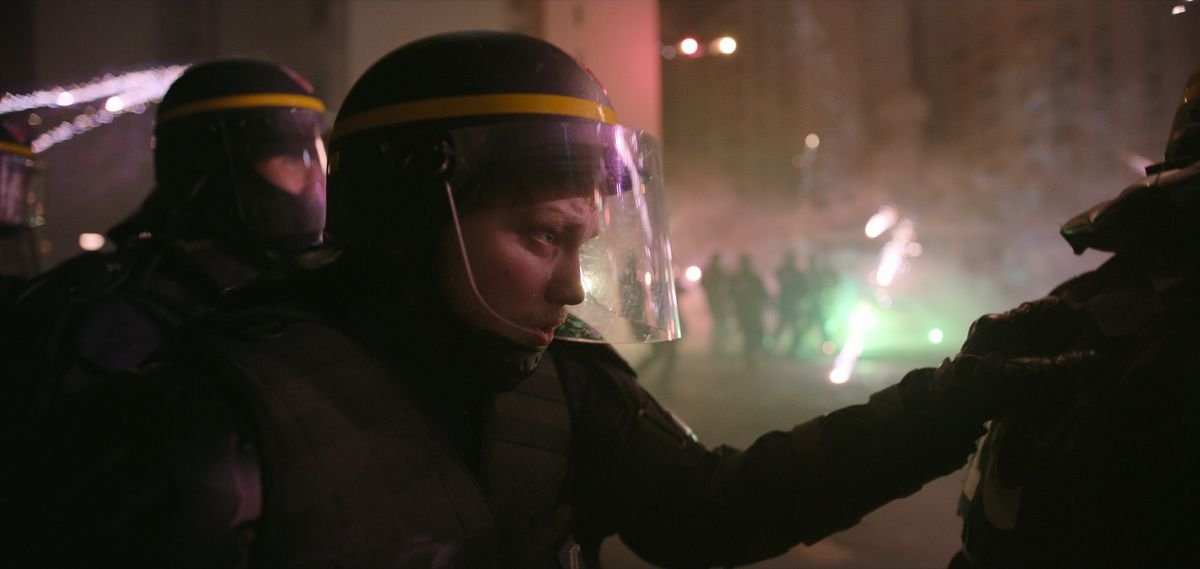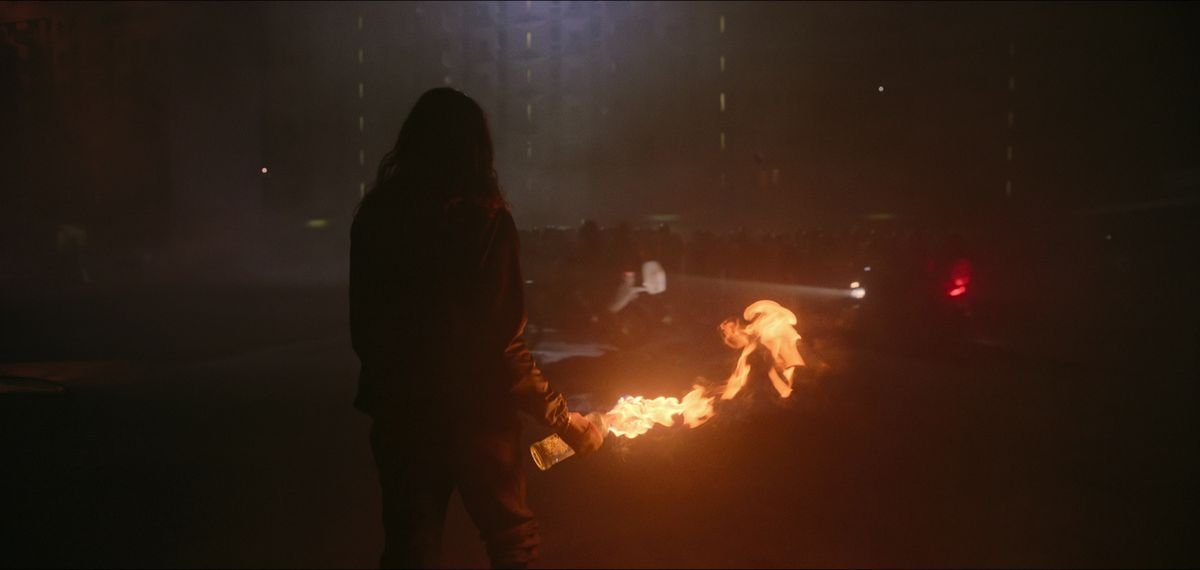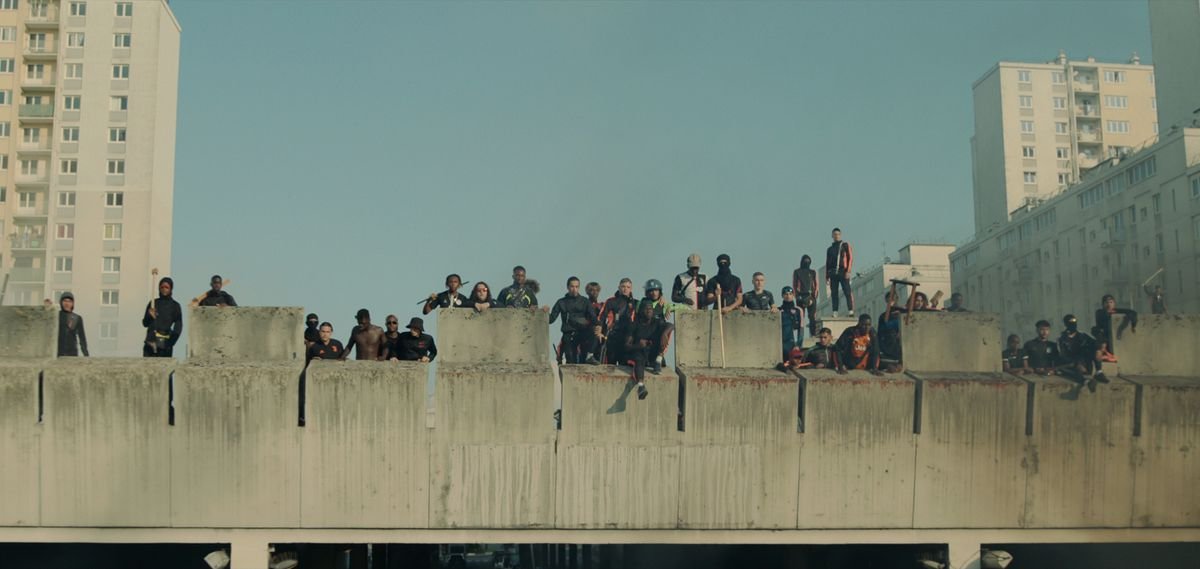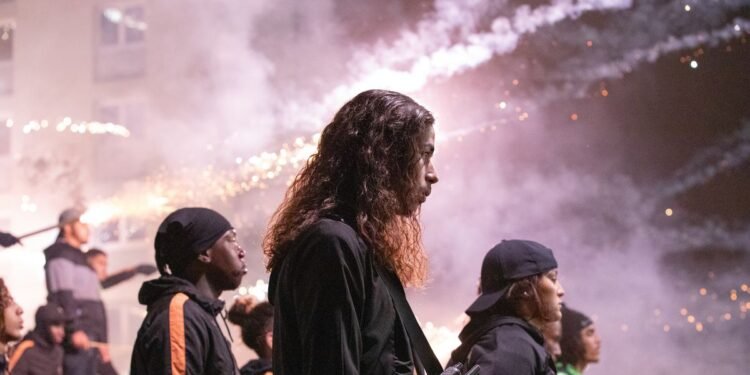Athena, the latest film from music video director Romain Gavras, is a one-trick pony, but that trick is so formally dazzling that the movie is an enrapturing experience. Composed of several lengthy, labyrinthine takes spaced out by traditionally edited scenes, it follows three French-Algerian brothers in Paris — young and middle-aged adults from different walks of life — thrown into disarray in the immediate aftermath of a harrowing family tragedy.
Their youngest sibling, a child named Idir, has been murdered, and the culprits caught on camera appear to be French police. The oldest brother, Moktar (Ouassini Embarek), is a drug and weapons trafficker who only looks out for himself. Middle brother Abdel (Dali Benssalah) is a career soldier dedicated to keeping order. The most flammable piece of the puzzle, however, is the youngest surviving brother, Karim (Sami Slimane), a charismatic leader with mournful, sunken eyes, who sparks a riot in his housing project that quickly spreads across the city.
The film’s introductory sequence sets the stage for numerous impressive tableaus of state violence and anti-fascist uprising, each of which begins as a personal portrait before pulling out to reveal a bigger picture. It opens during a stilted police press conference about Idir’s killing, where Abdel happens to be present and in uniform. The scene ignites when a group of angry demonstrators lobs a Molotov cocktail at the pulpit. The subsequent unbroken take lasts more than 10 minutes.

Photo: Netflix
Though the sequence begins in a highly sterilized setting, it rapidly explodes into white-knuckle chaos, following Karim and dozens of other black-clad protesters as they not only commandeer guns and police vehicles, but drive them across the city in a high-octane chase, back to the makeshift fort they’ve built at the Athena housing complex (named, fittingly, for the Olympian goddess of battle strategy).
This eruption, it seems, was a long time coming. Rather than retreading and reexplaining the surrounding politics — as in the United States, police killings of civilians and the subsequent protests have dominated headlines in France for years — Athena opens during a breathtaking climax that continues for nearly all of its 97 minutes. What we’re witnessing in watching Athena is the start of an inevitable war.
Gavras captures it with cranes, drones, and techniques that defy logic, and frames it with hundreds upon hundreds of extras in winding and enormous patterns. It’s tactile, yet ethereal. The camera dips between vehicles, shooting them from across the street like passing chariots, then rides up alongside them and dives inside them with the characters, before pulling back out again to capture the head-spinning scale of the uproar.
Gavras’ frame on the action charges from one moment of violent resistance to the next at breakneck speed, hinting at how widespread this furor already is by the time the film begins. But the staging of this opening scene also serves a second function. It gives us the lay of the land, a detailed sense not just of the movie’s visual and emotional texture, but of the streets between the police station and Athena, where countless onlookers line the rooftops and cheer Karim on, and where the rest of the story is set to unfold. Before long, neighboring housing projects announce their allegiance to Athena, like kingdoms joining the fray in Middle-earth.

Photo: Netflix
Rarely has a movie so mimicked the feeling of riding a rollercoaster, with peaks and valleys that build to rushes of adrenaline, carefully resetting before each subsequent drop. Abdel and Karim lead opposing charges, as tides of SWAT teams invade fortified buildings full of rioters. Meanwhile, their half-brother Moktar weaves in and out of both plots, protecting his business interests first and foremost, when he could be assisting either side. The three brothers represent facets of French society in microcosm: the oppressor, the oppressed, and the moneyed third parties who benefit either way, whether or not they become involved. Their symbolism leads to a streamlined tale that sidesteps the need for too much exposition about who, what, or why.
The story is simple, but it runs the risk of being too simple. By throwing the audience headfirst into the mayhem, Gavras obscures some of the more straightforward emotional material. Athena centers on a vicious killing, and the subsequent plot plays like a magnified externalization of grief that, after numerous such state-sanctioned executions, has grown uncontainable. But the audience is never afforded the chance to ruminate on this grief, or to truly feel it through the brothers’ eyes. Even though the film occasionally slows down to depict tender moments of communal mourning in the trio’s Muslim community (including a fleeting encounter with the brothers’ mother), there’s no pause to get to know the brothers outside their prescribed roles as symbols for larger unrest.
That said, while the film seldom dramatizes their emotional wounds, this symbolic depiction also lends itself to the aesthetic approach Gavras has employed throughout his career. While Gavras has made two other narrative features (Our Day Will Come and The World is Yours), he’s best known for his blistering music videos, particularly M.I.A.’s “Born Free,” which sees militarized police systematically hunting redheads in a fantasy-racism scenario, and Jay-Z and Kanye West’s “No Church in the Wild,” which features some of the most striking imagery of fiery protest in popular media.
Athena plays like a feature version of the visual fixations in those videos — compressed stories where brutal state violence is a preexisting condition whose root diagnoses are an afterthought, but whose terminal symptoms Gavras explores in stark, visceral hues. (The film is also, in subtler ways, a successor to Gavras’ video for “Signature” by his late friend DJ Mehdi, a vivid depiction of a suburban community where the camera captures detail and lived experience by moving through communal spaces.)
Athena is arguably a style-over-substance movie, given how little time and attention it devotes to the personal drama underlying its politics. But in Gavras’ hands, the style is also the substance, with a restrained classicism giving way to baroque staging as each long take accelerates. Scenes build in ways that feel both narratively inevitable and visually prophetic. Gavras and cinematographer Matias Boucard seem to be exploring the hidden dimensions of these police-and-protester clashes through movement — not only the movement of their subjects, but the movement of their camera, which tilts and turns as if to capture every possible vantage. Speed the film up any further, and you’re left with something approaching cubist art, with dimensions and perspectives practically overlapping amid all the pandemonium.

Photo: Netflix
The rehearsed nature of each long take isn’t just a neat gimmick, the way it arguably is in Sam Mendes’ 1917, a war film whose faux one-take design loses perspective on the characters’ surroundings, causing its tension to dissipate. Instead, the choreography in Athena is its own symphony, placing the living, breathing details of the brothers’ environment in its crosshairs with every turn, as it builds to moments of darkness swiftly consumed by flame. Thick smoke and flying embers soon become its default lingua franca, as if it were an up-tempo remix of Sergei Bondarchuk’s War and Peace. The music, by Gavras’ own collaborative project Gener8ion, combines booming, Hans Zimmer-esque percussion with operatic vocalizations in a fixed state of crescendo. The music, like the image, rarely stops moving or progressing, but around each corner lies some new and surprising confrontation, so it never loses steam.
Gavras shot Athena with IMAX cameras, which makes it all the more ripe for viewing as an arresting visual spectacle first and foremost. (Its stateside theatrical release, unfortunately, was limited to a week on one New York screen.) That said, a small-screen viewing on Netflix is still likely to feel emotionally charged, since another key ingredient is the filmmaker Ladj Ly, who co-wrote Athena with Gavras and producer Elias Belkeddar. Ly was the director behind the 2019 Les Misérables, a modern retelling of the Victor Hugo novel that was nominated for Best International Feature Film at the 92nd Academy Awards. Like Athena, it zeroes in on tensions between French police and communities of color, and it similarly leads to climactic eruptions.
His take on Les Misérables is a fantastic film, and while his approach is more measured (and arguably more nuanced) than Athena’s, combining Ly’s community focus with Gavras’ audacious, mile-a-minute stylings results in a handful of quiet moments. These punctuate the turmoil, allowing brief but volatile respites. Before the audience knows it, the characters are back into the fray, into a chaotic world that threatens to consume them. And their own irrepressible fury is just as dangerous. With Athena, Gavras transforms that anger into living dioramas that are so technically jaw-dropping that they become emotionally rousing too.
Athena streams on Netflix beginning Sept. 23.
























































